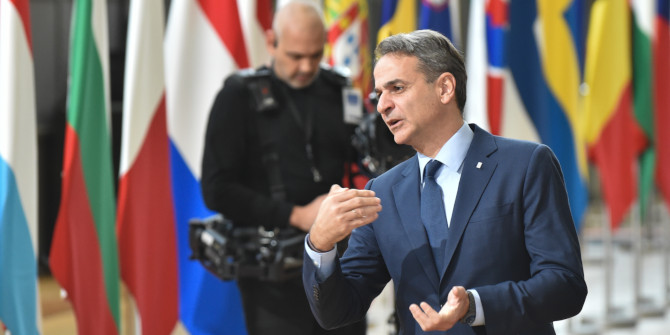The election of Maia Sandu as President of Moldova in 2020 and the victory for the party she founded at this year’s Moldovan parliamentary election have been viewed as watershed moments in the fight against corruption within the country. Dorina Baltag and Isabell Burmester argue that while Sandu’s electoral success provides a window of opportunity, a parliamentary majority alone will not be enough to bring genuine change. Only by embedding new norms of governance in Moldovan society can the country’s persistent corruption problem finally be resolved.
In July this year, the pro-European Party of Action and Solidarity (PAS) won a clear victory in Moldova’s parliamentary election. Following the election, the party’s founder and current Moldovan President, Maia Sandu, a Harvard-educated economist viewed internally and externally as an anti-corruption crusader, pledged to put an end to what she termed “the rule of thieves”.
Moldova’s commitment to implementing anti-corruption reforms dates back to 2005 when then President Vladimir Voronin, the leader of the Moldovan Communist Party (PCRM), adopted a pro-western and pro-democracy stance with the aim of winning electoral support. In the years that followed, several acts of legislation were passed, including a law on political parties and an amendment to the electoral code. These changes, alongside public awareness campaigns initiated by the government, were commended by international actors.
After the fall of the Voronin regime in 2009, a coalition of four pro-western parties came to power under the leadership of Vlad Filat of the Liberal Democratic Party (PLDM). Filat subsequently announced an ambitious anti-corruption strategy at a time when the EU and Moldova were just beginning negotiations over an Association Agreement.
Association Agreements are a key component of the EU’s Eastern Partnership initiative. One of the aims of these agreements is to provide a broad framework for codifying democratic reforms. Yet despite Moldova ultimately signing an Association Agreement with the EU in 2014, the country is still far from a stable democracy.
While Moldova was once viewed as a frontrunner among the countries targeted by the Eastern Partnership, a major banking scandal in 2014 involving the disappearance of funds totalling over a billion dollars severely dented this reputation. Indeed, pro-European rhetoric has been actively used in Moldova as cover for removing mechanisms that constrain corruption. This was an underlying factor in the so called ‘Russian Laundromat’ scheme through which large sums of money were moved from Russia via Moldovan banks.
EU incentives have proven to be so strong that even corrupt governments have attempted to seek legitimacy by initiating pro-European agendas. In the case of Moldova, the adoption of pro-European discourses and promises of future integration did not lead to a viable reform programme. This raises the question of how the anti-corruption commitments contained in Association Agreements can be effectively realised.
Paying lip service to reforms
Most Moldovan decisionmakers have expressed support for anti-corruption efforts over the last decade. Yet their actions have not reflected this commitment. Filat’s period in power ultimately ended with his arrest on corruption charges related to the 2014 banking scandal. But his government also obstructed the implementation of anti-corruption laws either by failing to provide enough resources or by simply copying EU laws without adapting them to the circumstances within Moldova.
The bank fraud scandal led to anti-corruption protests and pressure from think tanks and other actors to combat corruption. These protests resulted in the formation of opposition parties, notably the Dignity and Truth Platform Party (DA) and the PAS, who used the momentum of the protests to win power in the 2019 Moldovan election under a coalition (ACUM) led by Sandu. ACUM and Sandu entered office ready to tackle corruption, subsequently implementing a comprehensive package of legislation, launching investigations into high profile corruption cases, and overseeing the dismissal of directors of national agencies who had links with corrupt practices.
Nevertheless, the majority of Moldova’s political elite did not agree with these measures and the ACUM government was dismissed via a vote of no confidence at the end of 2019. Sandu, who was elected as President in 2020, remains convinced that large scale corruption is the main problem impeding Moldova’s progress. As she continues the fight against corruption, the opposition have continued to obstruct her efforts, for example by initiating the supra-legal arrest of the country’s anti-corruption prosecutor.
A subtle merger of western and Soviet norms
Moldova is an archetypal example of the way in which several post-Soviet states have mimicked democratic reforms and initiated processes to gain the public’s trust while simultaneously failing to make a full transition to democracy. These practices are supported across society by both those who were socialised under communism and by those who have grown up in a post-communist country.
The dismissal of Sandu’s coalition in 2019 represented a clash between the agenda of a predominantly western-educated anti-corruption government and the old Soviet practices of preserving power in a single leader, namely the then President Igor Dodon. Sandu’s agenda threatened the interests of a large number of Moldova’s political elite and this prompted the vote that ultimately brought down her government.
However, post-Soviet practices can also be observed in the small details that shape how the political system functions. Examples include the need for civil servants to seek approval from the heads of their institutions before delivering sensitive information, the mass re-recruitment of civil servants by new governments, and the divisive, warlike rhetoric adopted by many politicians. As previous research shows, Moldova’s democratisation process is destined to be ‘slow’ and ‘dreadful’ for as long as these post-Soviet practices prevail.
Finding a way forward
The only way for Moldova to break from its post-Soviet practices and establish new norms of governance is for these norms to be embedded at the societal level and then transposed into politics. This is because many of the country’s reformers are societal rather than political actors.
The most prominent example of this is Sandu. Many have viewed her rise to power as a turning point in the country’s fight against corruption given her explicit commitment to tackling corruption. Yet societal groups such as NGOs, independent media organisations, and grassroots movements will be vital if Sandu is to succeed. Although media freedom in Moldova has declined in recent years, as shown in rankings such as the World Press Freedom Index, investigative reporting teams at organisations like Ziarul de Gardă and Cu Sens continue to expose corruption cases. This has ensured that awareness of the problem is rising among the public.
The landslide victory by the PAS in this year’s election could yet prove to be a watershed moment in the fight against corruption, but a parliamentary majority alone will not be enough to ignite genuine change. Stronger ties with societal actors will be vital to this process. Moldovan civil society organisations are mature enough to exert pressure through their participation in policy-making processes and they are powerful norm-promoters. Non-institutionalised civil society actors, such as diaspora communities and grassroots movements, are also an important source of knowledge and expertise when it comes to initiating change.
What is ultimately required, however, is for the whole of Moldova’s political elite to subscribe to the principle that fighting corruption is desirable and for them to behave accordingly. Only if they internalise this norm can Moldova break from its post-Soviet practices and move forward.
For more information, see the authors’ recent article in Democratization
Note: This article gives the views of the authors, not the position of EUROPP – European Politics and Policy or the London School of Economics. Featured image credit: European Council





How does this hopefully new Moldovan Democracy propose to deal with Transnistria/Russia ?